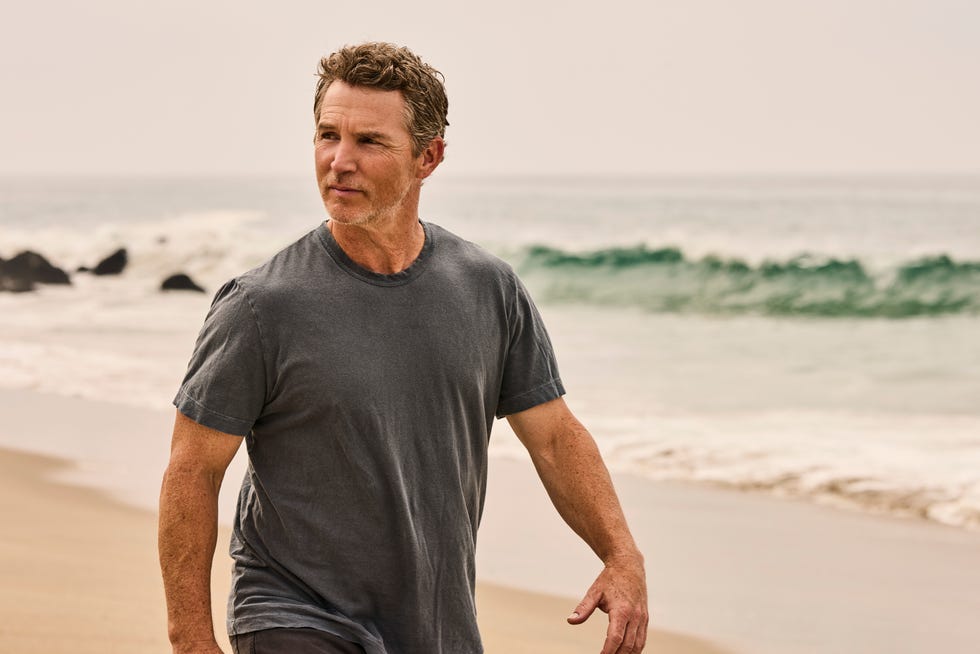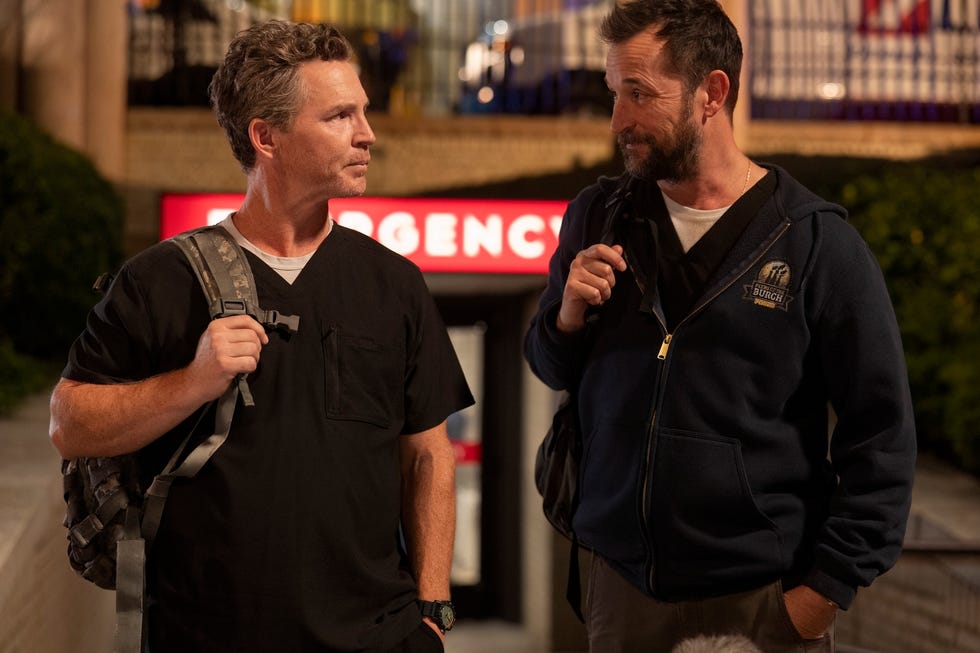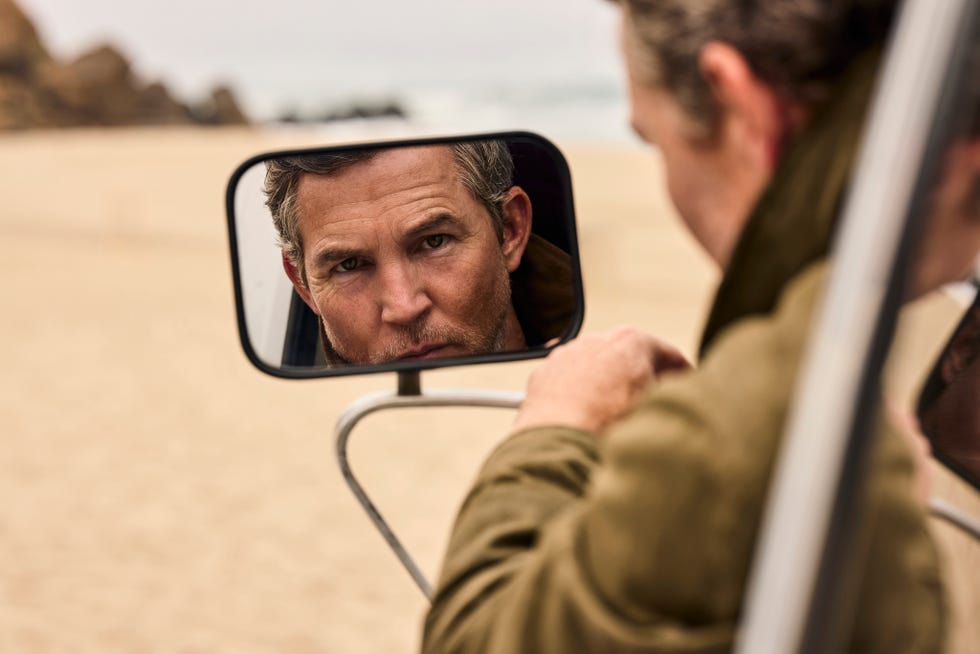Shawn Hatosy Understands the Power of <em>The Pitt</em>

When The Pitt premiered in January of this year, it struck a chord with audiences across the country. While premise wasn’t exactly groundbreaking—each episode unfolds over the course of a single hour during a 12-hour shift in a Pittsburgh emergency room—it stood out as a medical drama that, refreshingly, focused on actual medicine. Its realism was so convincing that it left little room for disbelief; it simply felt true. The same could be said for its characters.
Shawn Hatosy plays one of them: former combat medic and current E.R. doctor Jack Abbot, a character who, even after a full season, we still know little about. He’s a Renaissance man who brings both skill and levity to The Pitt; self-possessed yet unafraid to be vulnerable. We first meet him in the pilot episode as he wraps up a night shift, and he doesn’t reappear until a mass casualty event pulls him back for the final four episodes of the season.
Hatosy has been a constant presence on screen for the for the past thirty years, appearing in films that feel synonymous with the ‘90s—The Faculty, Inventing the Abbotts, The Postman, Anywhere But Here. The Pitt marks his fifth collaboration with series creator John Wells, the first being a single episode of E.R. back in the mid-aughts. In recent years, he’s taken on standout roles in NBC’S Southland and Chicago P.D., and is perhaps best known for leading the cast of TNT’s Animal Kingdom as Andrew ‘Pope’ Cody. From cult classics to sleeper hits, Hatosy’s is an instantly recognizable face—a quintessential character actor to his core.
Which makes it all the sweeter that his role as Dr. Jack Abbot has brought him a career first: a Primetime Emmy nomination. As the summer wound down, and ahead of TV’s big night, Hatosy checked in with Esquire from his hotel in Vancouver where he’s currently filming. Since our conversation, it’s been announced he’ll direct an episode in season 2. “The work has always been there,” says Hatosy of his career. Now, with both the industry and audiences taking notice, it seems he’s getting the recognition he’s long deserved.

As you can imagine, fans are approaching Hatosy far more often these days. "I do find that walking out on the street has been different for me, and it’s a combination of The Pitt and Animal Kingdom coming back," he says.
ESQUIRE: I'm a '90s kid. I've watched you on screen for 30 years. What does it feel like to be at this point in your career—you’re older, married, and a parent—experiencing what I imagine is a career high?
SHAWN HATOSY: It's strange. I've had success, right? I've done shows and movies that have done okay and have their own little niche of fans. I've never had a show that has broken out the way The Pitt has. It's an amazing feeling because it has opened people's eyes to my past work. As The Pitt blew up, Animal Kingdom came back on Netflix. I'm sure that The Pitt has driven some of the success there, but now that is finding an audience. People liked Abbot so much that they're willing to go watch me transform into a sociopath psycho-killer with mommy issues.
After Animal Kingdom, there was a quiet time for me, and part of that was driven by the new era of self-taping. I was getting some offers, but some of the stuff that I was fighting for—that I really wanted, the prestige stuff—I’m still out there grinding it out and not booking through tapes. The business has changed so much, and back in the day, you used to have to go into a room, prepare something, create a character, and deliver it in one take. Actors become really good at that, and now that's gone. So [casting directors] are receiving a lot of self-tapes. They have many, many options of whatever they want.
Was that a function of COVID, or did the self-tape era start pre-pandemic?
I would say it is a symptom of COVID, but it was heading in that direction anyway, because the technology makes it very easy for directors and producers to see you. But now with COVID, casting directors don't have offices. They're not spending that kind of money. It is the way of the new world.
That lean period was scary. I have a family. I have kids. Then the strike happened and it was such a low point for me. I felt like, God, what am I going [to do]? I’m old, like you said.
No, I didn't say that!
No, but I'm older.
You're turning fifty this year. It’s a marker of time–and you’ve been consistently working for a while.
Honestly, if we were talking about this at that period, I would probably be in tears. But there's something about the way that this role, Abbot… I got out of the way of trying to appear youthful, accepted who I was, and in all his flaws and rawness, it created a new kind of character for me that people responded to. It landed at the right time, and I find the roles that I’m seeing are very cool. I'm excited, and I want to go as far as I can, and who knows what that looks like. It's a cool time.
[Abbot is] the kind of guy that believes if you serve your country, your country should have your back.
Was it easy for you to love Abbot? What parts of him did you connect with initially?
I always try to attach some sort of hope in the character that I can get behind that isn't coming from a dark place. I think even the bad people in this world—and there are many, especially right now—don’t set out to be bad. They come from a place where they think they're doing good. With Abbot, that wasn't hard to do. He shows up. The one moment for me that really pulls it all into focus is when he comes back in episode 12 and he's got the blood bag on—he's donating in the midst of [the mass shooting]. We don't hit the audience over the head with how it was revealed. It's very in the moment of the procedure. I just knew then. That was it for me. I was like, Oh, I love this guy.
It felt the same when Abbot removed his prosthetic leg in the finale. They’re sitting around having beers in the park—and this is just a function of his day. But it’s a total shock, especially to the audience.
It’s a shock to the audience, and it's a shock to the [characters] that are new and don't know. That's important. There were some discussions early on—should he have a limp? And we discussed that it needed to be a surprise. That works in Abbot's favor because he's not a person that should be identified by this. It’s not his identity. He is the commanding presence in this ER. He has combat medic experience, and he has a talent for this kind of work that others don't.
In those last few episodes, it really does feel like he's approaching this crisis as though it’s combat. To him, it’s a war zone. Did his past as a veteran affect your approach to playing him?
It totally did. I knew from a personal experience that I had. There was an episode at a kid's basketball game where a referee fell down in the middle of the game and he was going through a cardiac medical situation. Everybody was freaking out, including me. We called 911 and it was chaos. The paramedics just came in and it was like nothing. They did their work and they saved the guy.
That was one thing that I wanted to make sure I had. There were some ideas from the directors when we were doing some of the early scenes where I felt like maybe they wanted me to be—because I'm from the military—barking or ordering I just thought, No, that's not right. This guy is not that. He's seen this and worse—and if the man at the top is showing signs of cracking—then it's just going to filter down.

Does Hatosy think The Pitt season 2 will dive deeper into Dr. Robby and Dr. Abbot’s relationship? "I hope so," he says.
Watching this show as a parent felt like watching through a different set of eyes than I would have two years ago, before she was here. How does being a father of three play into your work?
My son had a medical issue when he was seven, and it was rough, man, as a parent. It went on for a year, and it plagued me, waiting for test results. The emotion that it evoked was not like anything I ever experienced. You have zero control, and you rely so heavily on the doctors. And his doctor was incredible and compassionate and understanding. And she had seen everything. But she really gave us the time and responded to emails at night. That landed with me in thinking about Abbot. I know that there are certain characters on the show that try to be detached from the emotional parts, but it's near impossible. Abbot has a different kind of emotional connection, and I built that on my own, and hopefully it stays, but you never know. When you're creating a character, you have these ideas and instinctually they come out and hopefully that continues to emerge.
You see it in the last few episodes, especially. When Abbot talks to Dr. Robby about therapy, it touches on this unexpected vulnerability he has. Will get into any of Robby and Abbot's history next season?
I hope so. I really don't know. I've read interviews too, and John Wells and [R.] Scott [Gemmill] talk about how this new season picks up in July. And you may not know that somebody has had a relationship up until that point; we’re dipping into one day. I'm curious. I don't have a lot of information about what my stuff is going to look like in season 2. I have some idea. Outside of Abbot’s two rooftop scenes, and the scene when we’re leaving the hospital, when I have the brief conversation with Robby about finding comfort in the darkness, there wasn't a lot of interpersonal stuff. It was mostly procedural, which is fine. I love the technical stuff. It makes us, as performers, seem invisible. So any kind of little character things that emerge, such as Abbot's way of teaching and trusting and guiding and not playing by the rules, these little nuggets that we get are so powerful because the procedure of it is everything. And everything works outwardly from there.
Out of all the procedural jargon, what was the hardest word for you to get, and what was the easiest?
I didn't have a ton. I feel like Patrick [Ball, who plays Dr. Frank Langdon] had some of the hardest words.
I just rewatched the last four episodes. You had some stuff.
I did?
You really did.
There are some words that just look like they shouldn't be pronounced the way they are, like "preperitoneal packing."
That was one of them.
I don't know, that one! They give us a list for each episode and I sort of write them out phonetically. Then I would take that list to Dr. Joe, who is one of the writers. He's nominated for an Emmy. He's fantastic. He was an ER attending. I would just have him read every word that I had to say on my iPhone, and then I would listen over and over again.

"One of the reasons it lands is because it’s so rooted in authenticity," says Hatosy of The Pitt’s astronomical success," and we don’t dumb it down in any way."
The Pitt is a medical drama first and foremost, but it’s hard to untangle from real current events in America. It's not a liberal show. It doesn't feel like a conservative show. How important do you feel it is to balance topics like vaccinations and mass shootings without aligning with any one particular ideology?
It's a great question. I was on a show called Southland where we were cops in LA, and it's hard not to take a side, but the best way to do it is stay in the middle and show it as honestly as possible. That's one of the beautiful things about The Pitt. You have a world of characters who are inherently decent. They're such well-drawn characters, each with their own point of view. You get little nuggets of those characters throughout this day, and in small doses, these characters land. That's the beauty of the writing.
I heard that they're going to go into the "Big Beautiful Fucking Bill," and I don't know what that means for Abbot. I don't know what has been written, but I can imagine his point of view, which is that he would take that personally. He’s the kind of guy that believes if you serve your country, your country should have your back. He's decidedly not political. He's not the guy that stands up in front of everybody and give speeches, but he would carry his anger into the shift. And if a vet needs care, then that's what they're going to get. If there's not supplies for them, he'll bring them in his go bag and use them. He'll find a way. And if the rules get in the way of trying to save a vet, he's going to break the rules.
I don’t want to leave this interview without talking about your first Emmy nomination. What does it feel like to be recognized by the industry in this way—I'm going to say it again—at this point in your career!
Getting nominated is a huge surprise, and I'm honestly overwhelmed. It feels really good. It's not because I'm chasing a trophy, but because the people that do this for a living, they're appreciating something that I'm very proud of. What makes it even more meaningful is that the show as a whole is being recognized. The Pitt has something important to say. It's a show that's being made efficiently right here in LA, and that matters to the business, and I love this business, and I hope it opens the door for more shows like it.
Are you getting recognized more?
I do find that walking out on the street has been different for me, and it's a combination of The Pitt and Animal Kingdom coming back... It means a lot when I'm walking down the street and a nurse comes up to me and says, "Oh my God, I couldn't watch it at first. It was like I was at work and I have PTSD from COVID anyway," Then, they're like, "But I powered through. And by the end, it was such a cathartic experience, so thank you." Or I'll have somebody come up and say, "I know a guy that was a combat vet and is an attending, and you and him are twins, so thank you for giving that guy a voice." It's powerful.
There have been so many medical dramas on TV, but The Pitt's success feels different. I'm curious to know if you could pinpoint a reason as to what that reason would be.
Well, one of the reasons it lands is because it's so rooted in authenticity, and we don't dumb it down in any way... We leave it there for people to see and explore. The fact that we keep it technical, it allows them in, in a way that feels like we trust them. And for the medical professionals, they're saying, "Oh my God, they're doing everything they can to get it right. They didn't get that right, but they're trying and we respect that." That's important. The characters are real. There's a little bit of everything for everybody. Also, in country that is so divided, we get to spend an hour with these people who, regardless of how they feel about that division, are going to do what is necessary to save people's lives. There are consequences to these efforts, because not everybody makes it. And it takes an emotional toll on these people—but they still do it, and they still show up, and they are inherently decent. And I think that's out there. That's what the people that decide to do this kind of work are.
Like you say in the last episode, it's in our DNA.
Abbot says it in the first scene: "I'm not sure why I keep coming back here." And there's a reversal at the end where Dr. Robby is up there on the edge, literally in Abbot’s spot from the first episode, and it crystallizes for Abbot in that moment. Even though this was one of the worst days they'll probably ever experience at work, there are people that have to do this, and we are the ones who can. For Abbot, it is comforting to know what your purpose is. And it makes the character complete. I don't always have that. And with this show, that's the answer. Everybody likes him. Not a lot of people don't, and I've also not had a lot of that in my career.
I can't imagine there have been any negative responses to him.
It's an incredibly positive response, and I hope that just serves it up to do as many as we possibly can.
esquire




